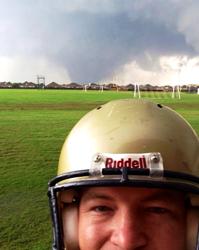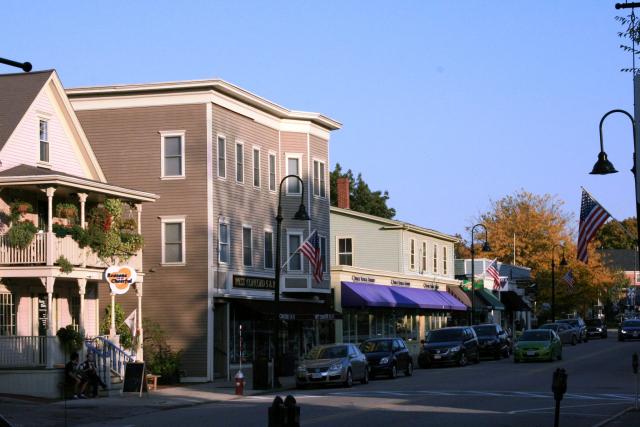Two things have weighed heavily on my mind the past two weeks: the tornadoes that have ravaged the Oklahoma City area, and the professional and amateur storm chasers who risk their lives to follow them.
On May 20, 2013, as I watched coverage of the EF-5 Newcastle-Moore tornado on CNN, I was worried about the football community in Newcastle, a town I had grown to know, respect and appreciate over the 8 months I spent visiting last year while producing and directing The Smartest Team documentary.
I knew the twister was coming because, that afternoon, I had been emailing with Kerali Davis - the mom whose e-mail inspired me to make the documentary - when she said she had to go pick up her son at school because a tornado emergency had been declared. It was from Tweets by Kerali and other Newcastle Racers parents and players that I learned later that evening that they were all safe. As we all now know, Moore, which borders Newcastle to the northeast, was not nearly so lucky.
It's hard for someone who has lived my entire life in the Northeast to imagine what it must be like to live right smack dab in the middle of "tornado alley"; to know that at any moment, with precious little warning, you might be forced to literally run for your life, to find shelter underground, and to pray that you, your pets, your friends, your homes, and your communities will be spared.
It's also difficult for me to understand why anyone would want to chase such deadly storms, both the amateurs who come from all over the country during tornado season and the professionals who chart the paths of tornadoes in order to warn those in danger to seek shelter.
I have come to know the folks in Oklahoma as some of the most resilient, no-nonsense, "roll-up your sleeves, get the job done" kind of people I have ever met. They are survivors. It is in their very nature. Perhaps it is because some are descendants of the great Native American tribes who have survived after nearly being wiped out as settlers moved west. Perhaps it is because they are the children and grandchildren of Oklahomans who rode out the Dust Bowl in the 1930's. Perhaps it's because they are so accustomed to violent, deadly weather. All I know is, no matter how hard the tornadoes hit their area, that they would pick themselves up, dust themselves off, and get to work rebuilding their communities and their lives.
I saw this same can-do spirit in the response of the Newcastle football community to the challenge concussions posed to their program. The football parents, players, coaches, trainers, and administrators all knew that something had to be done to reduce the number of concussions. But unlike when a tornado strikes, they didn't simply hunker down and ride out the storm. Instead, like the storm chasers, they decided to be pro-active: to meet the challenge head on, to take steps to reduce the risk of concussion, to identify and manage those that couldn't be prevented, to make the game safer for everyone on the team. In doing so, Newcastle is setting an example for the rest of the country on how to make football safer.

The people of Oklahoma are also setting an example for the rest of us in how to respond to disaster with courage and resilience. One especially valuable lesson in survival was set by the football team at South Moore High School. It is well known that the majority of deaths from a tornado are the result of a head injury; yet many don't think to keep a helmet (whether it be a football, baseball, motorcycle, hockey, or bike) on hand as part of a family's tornado emergency preparedness kit. According to a May 22 story in The Daily Beast, a quick thinking coach the school undoubtedly saved a lot of lives by having his players grab helmets at the tornado approached.
The story got me thinking: perhaps there's a use for all those old football helmets after their days of protecting kids on the gridiron are over, although, as the picture at right shows, it seems like the folks in Newcastle seem to have already gotten the message! [A side note: I received this pic from one of the Newcastle football moms, but I'm not sure from whom. If you know, please let me know so I can give proper credit. In the meantime, speaking of weather safety, does your sports team have a bad weather policy? It's never too late to put one in place.]
Hitting even closer to home
Besides my connection to Newcastle through its football program, I had another as well. Chris Curtis was a storm chaser and longtime manager of the West Concord Five and Ten in my hometown of Concord, Massachusetts. The Five and Dime has been one of my favorite stores since I moved to Concord with my family twenty-five years ago, a place where I could get everything from shoelaces for my kids' sneakers to Halloween costumes to sewing needles and what used to be quaintly called 'notions.' Over the years Chris helped us find what we needed for school or household projects.
When I happened to mention to him last year that I was going to Oklahoma to film The Smartest Team, I learned that Chris was a storm chaser. Every May, for more than a decade, he had spent two weeks in the area, doing the dangerous work of following tornadoes and relaying information to local authorities so they could send out warnings to those in the tornado's path. He became my advisor for all things Oklahoma.

On May 19th, Chris chased the tornado which struck Shawnee, Oklahoma. The next day he was witness to the "horrific" destruction in Moore. After driving to Texas, he wrote a first-hand account of what he saw for the Boston Globe before going to bed.
I can only imagine how difficult it must have been for Chris to sleep that night, his heart probably still racing from the day's events, fueled by adrenaline, probably playing over in his mind the scenes of destruction he saw on a scale few of us have ever seen. Sadly, Chris's dispatch for the Globe was the last thing he ever did. He died in his sleep; friends say the heart of this "gentle-giant" simply gave out.
My prayers go out to Chris Curtis's family and to all those in Oklahoma who have lost so much from the tornadoes. The tornado that struck on May 20th may be recorded as the Newcastle-Moore tornado, but its connection to Concord was something I will never forget.



















